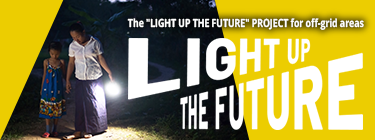Off-grid Solutions Project
 Indonesia Activity Report
Indonesia Activity Report
October,2018 - January,2022
Model development of utilization of solar energy for community business in borders of West Kalimantan
Activity Overview
Semitau and Suhaid, Kapuas Hulu, West Kalimantan
Population: 662. Most people are engaged in farming or fishing. The village gains a plentiful catch due to its location near the river, but finds it hard to increase income because of the difficulty of preserving or processing the fish.

Main activities
Local human resource development through awareness raising and learning program
Development of human resources who are engaged in operation and maintenance of solar power supply station* Awareness raining of how to utilize electricity.
Donation of Solar power supply station* and Solar storage system
We will supply enough electricity to local places where we live together.
- Power supply station*
- Ene-loop solar storage
Support income generation
(development of local industry)
Developing models of local industry using electricity.
- Improvement of efficiency of processing fish
- Increasing of productivity of agriculture by improvement of soil
- Processing and marketing of agricultural products
- Improvement of processing natural honey
|
Target regions : |
Kapuas Hulu, Sub-district of Semitau (12 villages) and Suhaid (11 villages), West Kalimantan province, Indonesia |
|---|---|
|
Implementation period : |
2 years (January 2018 – December 2020) |
* This Power supply station (Power supply container) was discontinued in March 2019. So currently we cannot supply and donate it. Thank you for your understanding.
Partner organizations
Through technical support and interactive self-help processes for all of Southeast Asia, this organization helps improve community income and quality of life. Director Anton Soedjarwo was the youngest awardee of the Ramon Magsaysay Award which is called "Nobel Prize of Asia“, in 1983 for his community leadership.
Asian Community Center 21 (ACC21) is an international cooperation NGO working to reduce poverty in Asia based on a broad network with other Asian NGOs. It aims to help empower those people suffering from poverty in the Asian region. To achieve this aim, in collaboration with other Asian NGOs and civil society organizations, ACC21 promotes the following four FLOWs in Asia: FLOWs of (1) capital, (2) people, (3) information and (4) reform of policy and institutions. It also promotes development of human resources engaged in the four FLOWS in order to make them grow and be sustainable.
Village in harmony with a large river
The Marsedan Raya village is situated next to the Kapuas river, the longest river in Indonesia. 662 people are living in nature located about 300 km inland from the provincial capital. Although about half of the houses have solar panels or power generators installed with government subsidies and use lights, residents are able to use electricity only 40% of the time due to inadequate power generation capacity.


Creating income sources
from the blessings of nature
Although the village is rich in fishery resources, it is difficult for the residents to make a living solely with fresh fish because they don't have access to refrigerators. They produce salted or dried fish by hand. In addition, farm crops and honey produced by boiling down natural honeycombs constitute limited income sources. If they have access to power, then the processing productivity and quality will improve and lead to an increased standard of living.




Activity Results
Realizing the production of processed agricultural products through the use of electricity.
Approximately two years since January 2018, Panasonic has made progress in the development of a model for livelihood development through solar power generation in a frontier of West Kalimantan, through the tripartite partnership among Panasonic, Yayasan Dian Desa and Asian Community Center 21.
Towards the goal of making social impacts by achieving sustainable development of the communities, we designed participatory activities, involving the local communities. Our efforts yielded appreciable results, including the development of processed food from local agricultural products by using electricity generated from photovoltaic and energy storage systems.
Inputs
(investments)


Activities


Outputs
(activity results)





Future activities to create more social impacts
To improve the income of local communities facing financial difficulties, we will further accelerate project activities through ensuring the sustainable production of processed food and develop sales channels to share the profit with the local communities.
We launched a new project to promote photovoltaic power generation systems for off-grid and semi-electrified areas. To realize that, we will develop easy-to-use photovoltaic power generation systems for homes and implement test marketing including development of a leasing scheme.
![[Continued]Development of models for improving livlihood by using photovoltaic power generation systems/01 Continued production of processed foods - Continue purchasing raw materials (moringa, roselle, etc.). - Improve processing techniques./02 Sales of processed foods - Expand sales channels to urban areas. - Run sales promotion campaign and develop an “e-commerce” system. - Sell products via an online shop in addition to physical stores.](/content/dam/panasonic/phd-global/en/corporate/sustainability/citizenship/solution/off-grid/indonesia_report/img06.png)
![[New]Promoting photovoltaic power generation systems for off-grid and semi-electrified areas:01 Development and testing of photovoltaic power generation systems usable in homes 02 Development of a leasing scheme and implementation of test marketing](/content/dam/panasonic/phd-global/en/corporate/sustainability/citizenship/solution/off-grid/indonesia_report/img07.png)









Expected social impacts
Outcomes